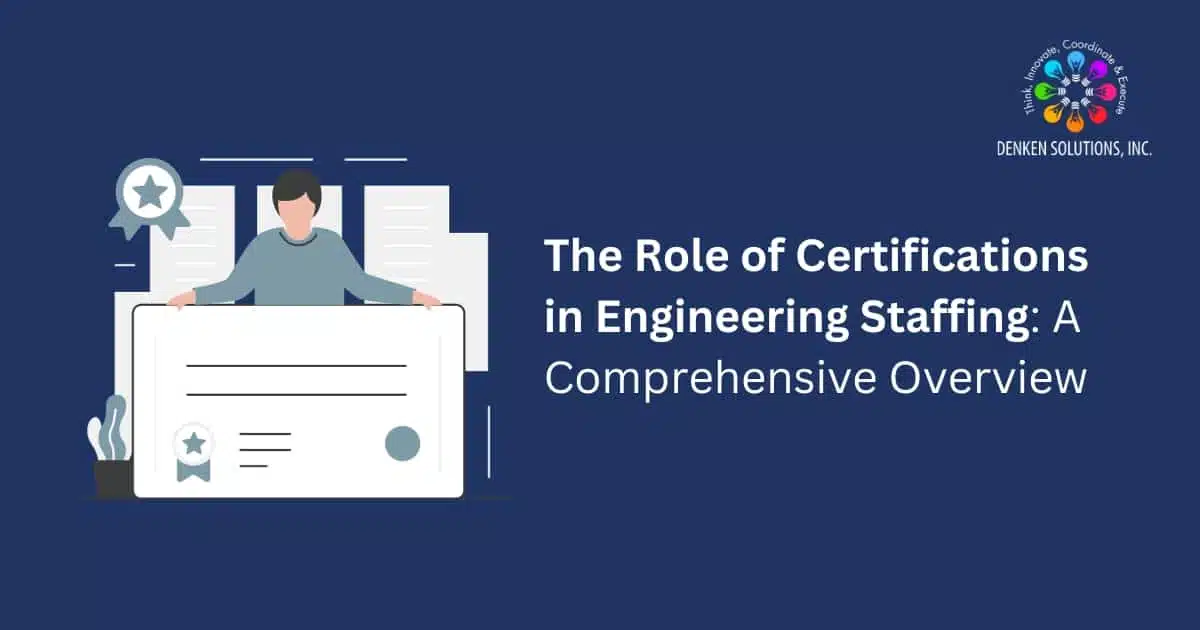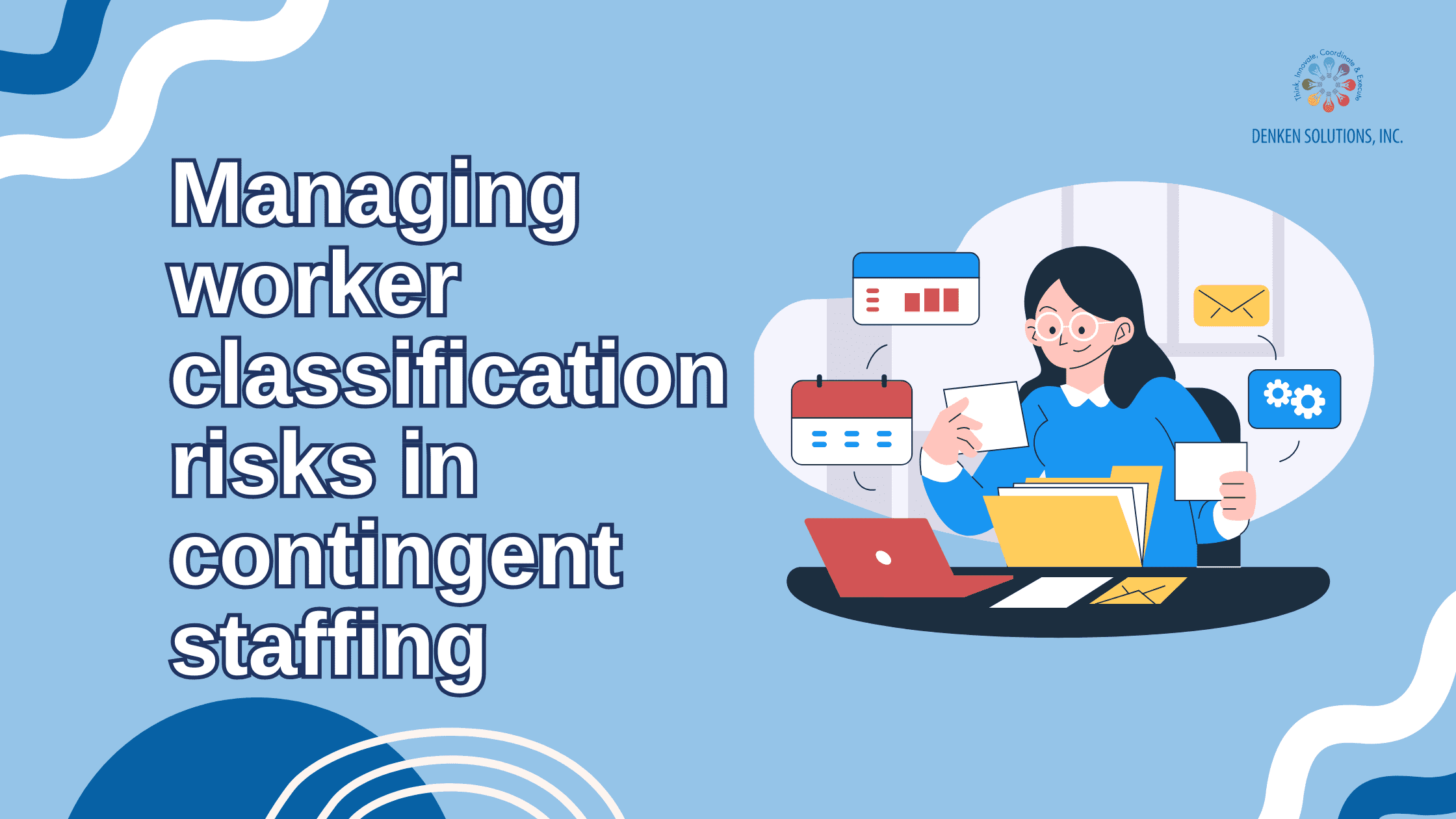The demand for highly skilled professionals is incessant in the rapidly advancing world of engineering, where innovation is the driving force. Academic qualifications lay the foundation, but in an industry marked by constant evolution, employers are seeking individuals who not only possess a strong educational background but also demonstrate specialized knowledge and expertise. In this context, certifications have emerged as a critical component in engineering staffing, providing employers with a tangible measure of a candidate’s proficiency in specific areas. This article delves into the multifaceted role of certifications in engineering staffing, exploring their significance, various types, and the substantial impact they wield on career progression.
The significance of certifications in engineering
Certifications hold profound significance in the realm of engineering, serving as a reliable metric for employers to gauge an individual’s skill set. While academic degrees provide theoretical knowledge, certifications validate practical skills and domain-specific expertise. In a competitive job market, where the quest for top-tier talent is relentless, certifications have become a distinguishing factor that sets candidates apart. Beyond the academic realm, certifications signal a commitment to continuous learning and professional development, attributes highly prized in the dynamic landscape of engineering.
Types of certifications in engineering
1. Professional Engineering (PE) certifications
One of the foundational certifications in engineering, the Professional Engineering (PE) certification, is often a prerequisite for engineers engaged in public projects. PE certifications are granted by licensing boards and affirm that an engineer has met the necessary educational and professional standards. Attaining PE status not only adds credibility to an engineer’s profile but also opens doors to a broader spectrum of career opportunities.
- Civil engineering PE: Focuses on professionals involved in civil engineering projects, such as designing and overseeing construction projects.
- Mechanical engineering PE: Validates expertise in the design and implementation of mechanical systems, machinery, and equipment.
- Electrical engineering PE: Targets professionals specializing in electrical systems, including power generation and distribution.
2. Vendor-specific certifications
In a technology-driven era, many engineering roles necessitate expertise in specific technologies or platforms. Vendor-specific certifications, such as those offered by industry giants like Microsoft, Cisco, or Autodesk, are instrumental in validating a candidate’s proficiency in using their products or services. For instance, a Microsoft Certified Azure Solutions Architect demonstrates expertise in designing and implementing solutions on the Azure platform, while a Cisco Certified Network Professional (CCNP) showcases advanced knowledge in networking technologies.
- Microsoft Certified: Azure Solutions Architect Expert: Demonstrates proficiency in designing and implementing solutions on the Microsoft Azure cloud platform.
- Cisco Certified Network Professional (CCNP): Validates advanced knowledge in networking technologies, including routing, switching, and troubleshooting.
- Autodesk Certified Professional (ACP): Focuses on validating skills in using Autodesk software for computer-aided design (CAD) and drafting.
3. Project management certifications
The ability to manage projects effectively is a coveted skill in engineering, where intricate projects demand meticulous planning and execution. Project Management certifications, such as the Project Management Professional (PMP) or Certified ScrumMaster (CSM), go beyond technical prowess and focus on equipping engineers with the skills needed to lead and manage projects successfully. These certifications are particularly valuable for professionals aspiring to take on leadership roles and contribute to the strategic direction of their organizations.
- Project Management Professional (PMP): A globally recognized certification that signifies mastery in project management principles and practices.
- Certified ScrumMaster (CSM): Emphasizes proficiency in Scrum methodologies, particularly in managing Agile software development projects.
- PRINCE2 (PRojects IN Controlled Environments): Validates knowledge in structured project management, widely used in various industries.
4. Safety certifications
In sectors such as civil engineering or manufacturing, where safety is paramount, certifications play a crucial role in ensuring a secure working environment. The Occupational Safety and Health Administration (OSHA) certification is a prime example, emphasizing a commitment to workplace safety. Engineers with OSHA certifications are well-positioned to contribute to creating and maintaining safe working conditions, an aspect that is integral to project success and employee well-being.
- Occupational Safety and Health Administration (OSHA) Certification: Demonstrates knowledge of occupational health and safety standards, critical in construction and manufacturing.
- Certified Safety Professional (CSP): Focuses on comprehensive safety practices, risk assessment, and hazard control in diverse work environments.
4. Specialized technical certifications
As engineering disciplines become more specialized, there is a growing demand for professionals with in-depth expertise in specific technical domains. Specialized technical certifications, such as Certified Information Systems Security Professional (CISSP) for cybersecurity or AWS Certified Solutions Architect for cloud computing, provide validation of specialized skills. These certifications not only enhance a candidate’s employability but also contribute to the overall resilience of an organization by ensuring that it has experts in critical domains.
- Certified Information Systems Security Professional (CISSP): Validates expertise in cybersecurity, covering areas like security architecture and risk management.
- AWS Certified Solutions Architect – Associate: Demonstrates proficiency in designing and deploying scalable, secure, and fault-tolerant systems on Amazon Web Services (AWS).
- Certified Machine Learning Engineer (CMLE): Validates skills in designing, implementing, and maintaining machine learning models.
Impact on career progression
1. Enhanced employability
Certifications serve as powerful tools to enhance employability by showcasing specialized skills that align with industry demands. In a competitive job market, employers often prioritize candidates with relevant certifications, as it reduces the need for extensive on-the-job training. A certified professional enters the workforce with a proven skill set, making them a valuable asset from day one.
2. Career advancement opportunities
The pursuit of certifications is not merely a means to secure a job; it is an investment in long-term career growth. Certifications can be instrumental in opening doors to advanced job roles and higher-paying positions. Employers recognize the commitment and effort required to attain certifications, and as a result, certified professionals are often viewed as candidates with a proactive approach to professional development.
3. Global recognition
In an era of globalization, certifications that are recognized globally provide a distinct advantage. Many certifications have international acclaim, making it easier for engineers to pursue career opportunities in different regions. A certification that holds value across borders allows professionals to establish themselves as globally competitive candidates, broadening their horizons and facilitating cross-border career transitions.
4. Adaptability to technological changes
Engineering is a field characterized by rapid technological advancements. Certifications play a crucial role in ensuring that professionals stay abreast of the latest industry trends and technologies. Continuing education through certification programs enables engineers to adapt to changes seamlessly, ensuring that their skills remain relevant in an ever-evolving landscape. This adaptability is vital for professionals seeking long-term success in their careers.
5. Industry recognition and credibility
Certifications are often endorsed by industry associations and recognized bodies. Achieving a certification from a reputable organization adds a layer of credibility to an engineer’s profile. It serves as a testament to the individual’s commitment to maintaining high standards of professional excellence, contributing to the overall reputation of the engineering community.
Conclusion
In conclusion, certifications play an indispensable role in engineering staffing, providing a comprehensive evaluation of a candidate’s skills and knowledge. The dynamic nature of the engineering landscape demands professionals who are not only well-educated but also possess specialized competencies. Certifications serve as a bridge between academic qualifications and practical application, offering a tangible demonstration of a candidate’s capabilities.
For individuals, certifications are a pathway to enhanced employability, career advancement, and global recognition. They signify a commitment to continuous learning, a trait highly valued in an industry where staying ahead of technological trends is imperative. As technology continues to progress, the role of certifications in engineering staffing is set to become even more pivotal, shaping the future workforce and ensuring that professionals remain at the forefront of innovation and expertise. Engineers who invest in continuous learning through certifications position themselves as leaders in an ever-changing industry, contributing to the advancement of technology and the overall betterment of society.
Denken Solutions is the best engineering staffing expert in the USA
Embark on a transformative journey with Denken Solutions, where unparalleled opportunities await both employers and employees.
For employers, our staffing services guarantee access to a diverse pool of skilled professionals, meticulously selected to elevate your team’s capabilities. Partnering with us ensures seamless integration of top-tier talent into your workforce, contributing to your organization’s success.
On the flip side, for talented professionals seeking career growth, Denken Solutions is your gateway to collaborating with Fortune 5000 companies and esteemed employers. Join us to unlock a world of possibilities, where your skills are valued, and your career aspirations find the perfect match. Check our career page for more information!
Elevate your business or career with Denken Solutions – where innovation meets expertise, and success becomes a shared journey.
Choose Denken; choose excellence.



